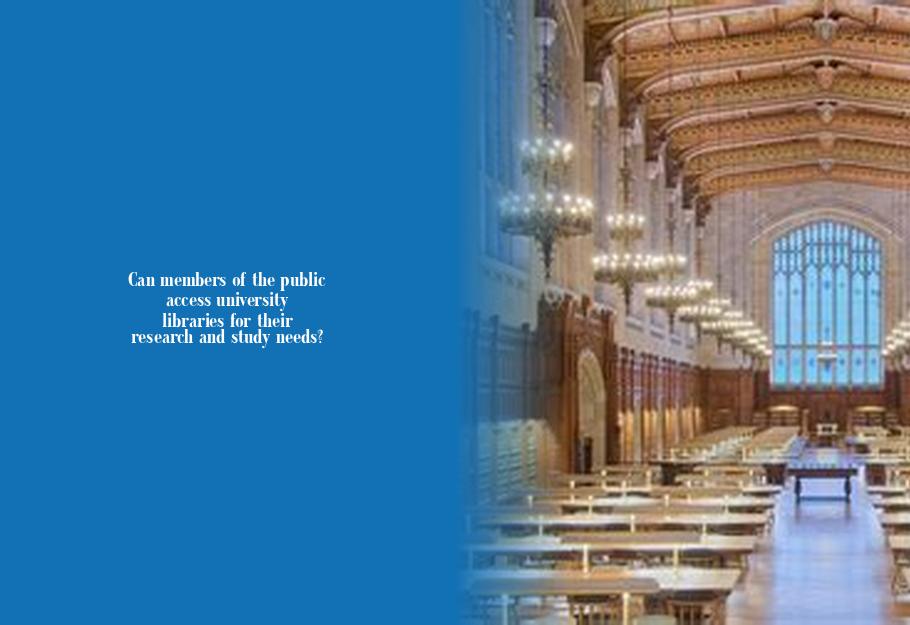Public Access Policies at University Libraries
Ah, the age-old question: can mere mortals stroll into the enchanting realm of university libraries, or are they destined to remain on the outside looking in? Fear not, brave bookworms and knowledge seekers, for I bring tidings of great joy and revelation!
So, you find yourself pondering, “Are university libraries open to the public?” Let me unravel this mystery for you in a most whimsical manner. Picture this: universities are like majestic castles of learning, with their libraries serving as guarded fortresses of knowledge. But fret not! These fortress gates may not be as impenetrable as they seem.
Let’s delve into the secret scrolls of information regarding public access policies at university libraries. Now, each citadel—oops, I mean university—has its own set of rules when it comes to welcoming outsiders within its library walls. Take Columbia University, for example. The gleaming shelves of its library are primarily reserved for current faculty, students, staff, and researchers who wield the mighty Columbia ID card.
But hold your horses! The State University of New York (SUNY) takes a different stance. Their policy decrees that the public shall be granted access to their libraries to the extent possible. A beacon of hope for knowledge-seekers far and wide!
And what about Montclair State library? Ahoy there! Their gates swing open to all visitors—be it a Montclair resident or a curious wanderer from afar. The treasure trove of resources awaits anyone daring enough to step inside.
Now, imagine this scenario: a daring Cornell student eyeing the fabled collections of Columbia library. Lo and behold! Cornell borrowers are granted the same borrowing privileges as their Columbia counterparts. A tale of reciprocal borrowing fit for bardic retelling!
Pro Tips: – When venturing into a university library as a non-member, always check with the library’s policies beforehand to avoid any unexpected twists in your quest for knowledge. – Don’t be afraid to ask library staff for assistance or recommendations during your visit—they’re like friendly wizards guiding you through the labyrinthine shelves.
Have you ever dreamt of perusing ancient manuscripts in a hallowed university library? Share your most whimsical literary fantasies with us below! And hey, keep flipping those pages—we’ve got more enchanted tales of university libraries coming your way soon! Onwards to greater realms of wisdom and wonder!
| University | Open to Public | Access Requirements |
|---|---|---|
| Columbia University | No | Valid Columbia ID or Visitor’s Card |
| State University of New York (SUNY) | Yes | Access given insofar as possible |
| Montclair State University | Yes | Open to all visitors |
| Cornell University | Depends on Borrower Type | Cornell borrowers receive borrowing privileges |
| Kean University | Yes | Open to the public with certain restrictions |
Benefits of Visiting University Libraries for Non-Students
While university libraries primarily cater to students, faculty, and researchers, many institutions open their doors to the public. These public library policies offer a treasure trove of benefits for non-students and strangers alike who dare to venture into these academic sanctuaries.
So, why should non-students consider visiting university libraries? Let’s uncover the hidden gems awaiting those brave souls who seek knowledge beyond the confines of traditional library settings.
- Access to Wealth of Resources: University libraries are veritable gold mines of information, housing a diverse collection of books, journals, digital resources, and specialized materials. Non-students can tap into these vast reservoirs of knowledge to quench their intellectual thirst and broaden their horizons.
- Guidance from Expert Librarians: Librarians are like mystical guides within the labyrinthine shelves of a library. These knowledgeable beings can offer invaluable assistance to non-students in navigating the sea of information, conducting research, and locating relevant resources for their quests.
- Cultural and Historical Preservation: Beyond academic textbooks, university libraries often harbor rare manuscripts, historical archives, and artifacts that preserve the essence of human history and culture. By exploring these collections, non-students can immerse themselves in a journey through time and gain a deeper appreciation for our shared heritage.
- Social Engagement and Learning Opportunities: University libraries aren’t just silent havens for solitary study; they also serve as vibrant hubs for community engagement. Non-students can participate in events, workshops, lectures, and exhibits hosted by these libraries to enrich their minds and connect with like-minded individuals.
- Fostering Lifelong Learning: The ethos of lifelong learning resonates within university library walls. Non-students who visit these establishments embrace a mindset of continual growth and self-improvement by exploring new subjects, acquiring skills, and staying intellectually curious throughout their lives.
Now that you’ve glimpsed into the wondrous realm of university libraries from an outsider’s perspective, seize the opportunity to step inside one near you! Uncover the untold stories bound within ancient tomes or unravel the mysteries encoded in scholarly journals—you never know what transformative experience awaits you within those hallowed halls!
- University libraries have varying policies regarding public access.
- Columbia University primarily reserves library access for current faculty, students, staff, and researchers.
- State University of New York (SUNY) grants public access to their libraries to the extent possible.
- Montclair State library welcomes all visitors, regardless of residency.
- Some university libraries offer borrowing privileges to students from other institutions through reciprocal borrowing agreements.
- When visiting a university library as a non-member, it’s advisable to check the library’s policies beforehand and seek assistance from the staff if needed.

